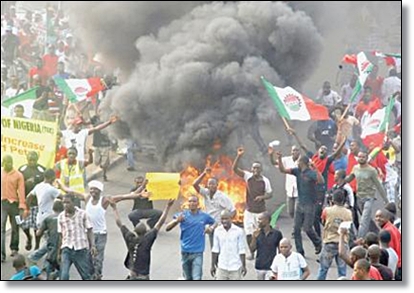Growth Calls for Intra Africa Resource Mobilization

 |
| Industrial action in Lagos, Nigeria Photo courtesy |
A surge in industrial actions may symbolize increased openness and tolerance in Africa’s governance systems. It could also be a pointer to growth on the continent forcing drastic readjustment of countries’ economic order. Industrial actions and inability of governments to meet workers demands possibly signifies governments’ shrinking revenues or mismanagement of resources as more people demand quality, accountability and efficient public service delivery. The much celebrated Africa’s growth momentum may be curtailed if it continues on the path of over-reliance on shallow taxation base, commodities exports and poor public finance systems.
Africa’s taxation regimes have relied mostly on visible sectors such as import and export; income tax in formal employment; Value Added Tax; corporate tax from large mining firms; large brewing companies; retail chains and large scale farmers among others. The abundance of these sectors varies from country to country with most countries having to rely on foreign aid to drive their service delivery mechanisms. The few existing visible firms are then expected to shoulder the burden of contributing towards tax revenue kitties to support close to 75% of their countries’ populations either locked up in unemployment, tertiary or subsistence farming.
According to Africa Development Bank Policy Brief of 2010 entitled “Domestic Resource Mobilization across Africa: Trends, Challenges and Policy Options” to increase revenue calls for deliberate efforts by government to create a balanced mix of their tax sources; push for more diverse trade in the region; create incentives for informal sectors to formalize; review tax preferences and transfer pricing by multinational companies and invest in effective tax policies and tax administration.
African governments can also mobilize resources locally by investing in corporate governance based on trust, transparency and promoting conscientious leadership. Rwanda took this route and launched a voluntary public financing scheme, the Agaciro Development Fund, which has since solicited over USD 3 million. The Rwandan example points at the urgent need for African countries to look inward for momentum to sustain growth. To mobilize resources within Africa calls for a coordinated and rationalized national, regional and continent wide public finance system. A regional and continental focus will widen the pool of stakeholders keen on transparency and save economies from the grip shortsighted elites.
The continent must put to an end the culture of exporting factories abroad through over reliance on raw material trade exchanges. It is possible; the continent simply needs to refocus the enthusiasm that is usually generated during political campaigns to enthusiasm to invest in production lines. The continent must seal leakages that shrink government revenues and redirect finances to investing in productivity. Increased wealth in emerging economies offers Africa a great opportunity to capture factories that targeted low income populations in those countries. Interest from developed countries’ investors seeking growth opportunities in Africa provide an excellent platform to negotiate for value addition production locally.
To drive up intra-Africa resource mobilization, the continent can as well take heed of a famous Chinese saying: “Resources is the mother of wealth; hard work is the father of wealth – only the two combined can produce wealth.” It is time African country governments and leaders strategize beyond their own borders to tap into the vast natural resources that go unexploited in the continent in order to release their citizenry from the indignity of poverty, economic deprivation and underdevelopment.
To address shrinking government revenues, it is incumbent to put in place policies that will draw more Africans from informal to formal with enablers that facilitate medium sized enterprises to scale up to large firms. In the absence of wealth creation strategies and better public finance systems, industrial actions by the people, instability of government and country, lack of industrialization and poor service providers will put the continent’s growth momentum on the back burner.
By James Shikwati,
The author james@irenkenya.org is Director of Inter Region Economic Network.
